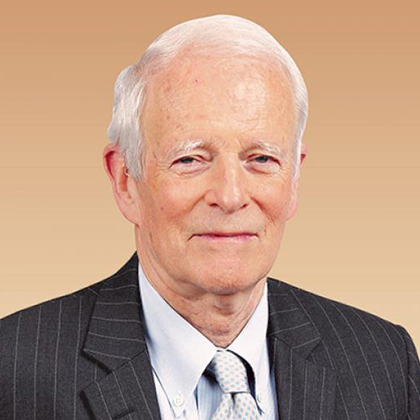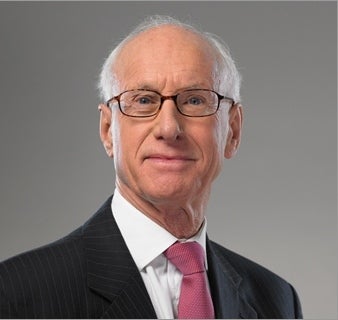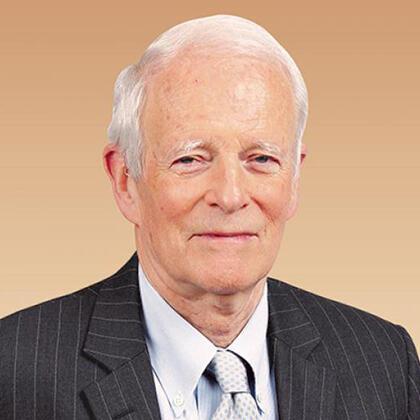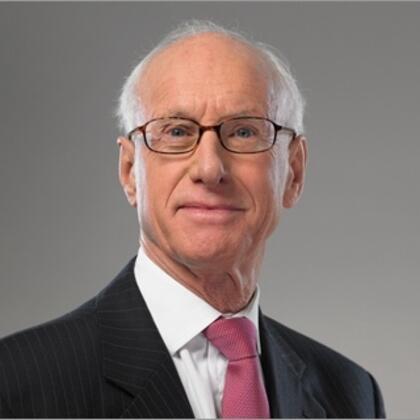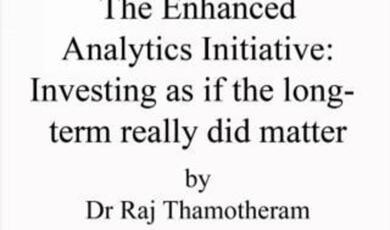How should International Financial Service Companies be Regulated?
Share
- Details
- Transcript
- Audio
- Downloads
- Extra Reading
Introduction by Lord Sutherland of Houndwood KT FBA PRSE, Provost of Gresham College
Chairman: Professor Avinash Persaud
Lecture delivered by Callum McCarthy, Chairman, The Financial Services Authority
Response by Sir Peter Middleton GCB, Chairman, Barclays plc
This was the 2004 Sir Thomas Gresham Docklands Lecture.
Download Transcript
HOW SHOULD INTERNATIONAL FINANCIAL SERVICE COMPANIES BE REGULATED?
Delivered by Callum McCarthy, Chairman, The Financial Services Authority
Introduction by Avinash Persaud, Mercers’ School Memorial Professor of Commerce at Gresham College, Chairman of Intelligence Capital Limited and Director of the Global Association of Risk Professionals
Response by Sir Peter Middleton GCB, Chairman, Barclays
Introduction
Professor Avinash Persaud
London has a long tradition of trading which can be traced back to the building of a permanent wooden bridge by the Romans in the first century AD, near the current site of London Bridge . But London ’s pre-eminence as a global trading centre only really started when Sir Thomas Gresham returned in the sixteenth century, from Antwerp , then the centre of European finance, to set up the institution known as The Royal Exchange.
It has taken us a long time to spread that lesson in other walks of life, that it is not just the right people, products and instruments that matter to economic activity, but the right institutions.
The regulatory system and its institutions are critical to the health of the financial system, and more important than that, they are critical to the vitality of the economy. As we have seen in Japan over the last decade, and earlier in the US during its Savings and Loans crisis, If there is no confidence and stability in the financial system, it doesn’t matter if interest rates are zero, there will still be no lending and borrowing. It is also important to remember that the growth of a market economy comes, not from big businesses, but from cash-strapped entrepreneurs and small businesses, and if they have no access to finance there is little prospect of growth.
I believe that the importance to the British economy of getting the right financial regulation is not fully appreciated, but few would say it is unimportant. There is a wider debate as to how we should do it, and today’s inaugural Sir Thomas Gresham City Lecture is about addressing that debate, full-on, not the details of regulation, that are reported in the national press every day, but the philosophy of regulation, what are we trying to do, why…and how.
Over the past couple years, lectures on financial regulation at Gresham College have developed a handful of fundamental questions that may help to guide regulators… questions that regulators should ask themselves… but seldom do.
I want to set the stage for Callum McCarthy by touching briefly on just two of those questions over the next 2 minutes.
Firstly, what is a transparent measure of the success of financial regulation. What would indicate whether we have a successful financial system or not.
The objectives are clear, of which the primary ones are some measure of consumer protection and financial stability, but these are apple pie and ice cream desires, who would not want these. The question is, how do we know we have achieved these objectives successfully, effectively and without excessive cost. There was plenty of financial stability in soviet Russia without much vitality. We do not want stability at the price of the Stalinisation of the British banking system, with few big intractable banks.
To me a key measure of success of the financial system, of any system, is how it treats its weaker participants. You don’t need a system to look after the strong; they will do so on their own. A good system is one that is wide enough to bring network gains but limited enough to function effectively, and where the weak and strong permitted into the system… are strengthened by it. One measure of that, not the only one, would be how easy is it for the weak in the financial system, small businesses and entrepreneurs, those at the economic frontier, to raise finance.
Secondly, where do you want risk to be? Risk is a necessary part of economic life. It relates in large part to the inherent risks associated with the uncertainty and volatility of events from hurricane Ivan to the US elections. If a regulators attitude to the trappings of risk is to remove it wherever you see it, all that will happen is that risk will move to where you can not see it, which is probably not the best place for it. Certain risks are to be accepted. As risk comes with economic activity, you cannot have one without the other, it is better, simpler, and incidentally cheaper, to start off by thinking where is the best place for risk and encourage it there; rather than expensively trying to rid each sector of it one by one.
These questions are simple to pose and hard to answer, but posing them should help us to narrow the number of wrong paths we could go down. Nobody wants a meddlesome regulator whose regulation is so pervasive that it inhibits entrepreneurism, growth and liquidity, channels risk to unsuspecting individuals, and does all of that expensively.
To guard against that is Callum McCarthy, Second Chairman of the Financial Services Authority. Before coming to the most difficult job in Britain , he already had a highly distinguished career as a civil servant, banker and regulator. As head of Ofgem he earned a formidable reputation and one for being tough on the providers, which is one of the first signs of being a good regulator and a sign that he is up to this task.
Which reminds me, the third key question a financial regulator must always ask before he regulates, is what regulation would look like, if it were captured and overly influenced, by the big banks. He should then write that version down and send it to all of his friends and the press, before he accepts the invitation to sit down with the banks, to discuss matters.
On this anniversary of his appointment, it is a useful moment to stand back from the day-to-day fire fighting of regulation and consider some of the wider issues that stand at the heart of developing regulation that is effective and efficient and as an indirect result, proves a boon to the City of London , the British economy and its citizens.
HOW SHOULD INTERNATIONAL FINANCIAL SERVICE COMPANIES BE REGULATED
Callum McCarthy
For me, the timing of this lecture could not be more propitious, as it falls on the first anniversary of my taking up my responsibilities as chairman of the FSA. I have learnt much in the last 12 months, and have been involved in many issues which are both important and of wide public interest: the challenges of establishing consumer competence and confidence so that, with correct information and proper behaviour by suppliers of financial services, there can be developed a market for retail financial services based on the principles of an efficient market rather than intrusive regulation; the redefinition of capital adequacy requirements for banks now being implemented under the banner of Basel II; the fundamental reform of the regulation of life companies so that regulatory requirements become more realistic, and encourage a sensible and realistic matching of liabilities and assets rather than being a somewhat arbitrary regulatory hurdle which did not necessarily encourage sensible and prudent behaviour; the policy on enforcement which underlies a regulatory regime. All these – and many other issues – are important, current and worthy of public discussion.
In selecting a topic for this evening's lecture, I wanted to choose one which also related to the life of Sir Thomas Gresham. That life had many episodes which provide links with subjects close to the concern of the FSA today. There is Gresham 's Law itself – like many eponymous concepts, not originally formulated by the man whose name it bears: a mark of the fact that publicity rather than original thought even in the 16 th century could prove important. Less well know is Gresham's activities on behalf of the Crown to support the exchange rate in Antwerp, where by 1552 the interest on the Crown's debts was £40,000 and the rate of exchange had fallen to 16 Flemish shillings to the £1 sterling. Gresham dealt with this challenge in various ways, but principally by spending £1,300 per week of Exchequer money in the Antwerp market to prop up the value of sterling, through secret money market operations. He bought, on a daily basis, small sums of sterling in undisclosed transactions – as he described it "it shall not be perceived nor shall it be no occasion to make the Exchange fall." Gresham subsequently had the task of repatriating – in the face of a prohibition on bullion exporting – his gold, a task which he solved by the practical device of smuggling it out to England packed (and concealed) in armour.
Faced with this history, I was tempted to use the link with Sir Thomas Gresham to discuss either the issues surrounding market manipulation or those surrounding money laundering. I decided however that to concentrate on these less savoury aspects of his career would be unattractive. What I want to discuss is the set of broader questions associated with Sir Thomas Gresham's international activities, namely in a world where international financial services companies are increasingly the norm, and where cross‑border transactions ever more important, how should regulation develop to match this increasing internationalisation? The reality of the question is clear. I am speaking this evening in Canary Wharf , where we have the offices of such international financial services firms as Morgan Stanley, Lehman Brothers, Bank of New York, Bear Stearns, CSFB and Barclays. There are many more firms in the City of London, including Deutsche Bank – which employs more in London than it does in its headquarters in Frankfurt – and Standard Chartered; some of which are the corporate headquarters (although their business may be more outside the UK rather than here), some are branches of businesses headquartered elsewhere, some are UK‑incorporated subsidiaries themselves with branches elsewhere in the EU. To illustrate this further, in one of the towers behind me here at Canary Wharf , there are the global headquarters of HSBC which has operations in some 80 countries and territories around the globe. Over two thirds of the HSBC group's profits come from outside of Europe , well over two thirds come from outside the UK .
In the other high tower behind me is Citibank International Plc, Citigroup's UK subsidiary and the headquarters of Citigroup's European activities. Citigroup, like a number of other US firms, makes extensive use of the ability to 'passport' throughout the European Union. It has established branches in Austria , Belgium , Denmark , Finland , France , Greece , Ireland , Italy , Luxembourg , Netherlands , Norway , Portugal , Spain and Sweden . Running these international businesses poses difficult and important questions of management and control for their management teams. They also raise difficult and important questions for regulatory authorities. It is these questions I wish to address this evening.
The issues which arise are common across financial services. They are not confined to banking, but arise equally – albeit in different forms – in both insurance and securities trading as well. They include both prudential issues – how to ensure that companies and groups, and the component parts of groups, are properly controlled and supported by adequate financial resources - and conduct of business issues – how to ensure that products and services originated in one country and distributed in others meet the standards required in all those countries. These are issues which are being discussed in particular in the context of the EU, but they arise equally in the wider global context: the supervision of Deutsche Bank, of Citigroup, or of HSBC raises issues which clearly require answers not merely within Europe , but worldwide.
Before I start this discussion of the issues, I should comment on one complicating factor. In financial services, as in other walks of economic activity, it is not unknown for regulatory issues to be used as camouflage for national protectionism. I find it hard to eradicate the suspicion, for example, that some countries' attitude towards the real supervisory issues associated with the relocation of supporting services to cheaper locations – either within the group or by outsourcing – is informed by a wish to preserve, at least in the short term, jobs at home. I intend to ignore these questions of base nature. And I would claim that in so doing I am reflecting in discussion what has been the reality of British regulatory policy for financial services. The FSA is concerned with efficient, orderly and clean financial markets, not with protectionism. We are indifferent to the nationality of the owners and the managers of the institutions we regulate.
Let me start by describing the present arrangements for supervision of financial services companies across borders. These arrangements are built on twin pillars, one personal or sociological; the second administrative. The former is what I sometimes describe as the fraternity of central bankers and regulators. By this I mean the mutual trust, shared vision, confidence and consciousness of mutual dependence – as well as of conflicts of interest – which exists among central bankers and, where they are different, financial supervisors. They share an understanding of the issues; recognise the special nature of the political territories – different in every country – in which they operate; are conscious of the constant need to balance independence and accountability; and are aware of the scale of their responsibilities, both prudential and conduct of business. These bonds are reinforced by the repeated nature of the contacts between us: at the BIS in Basel; in repeated European meetings; in more reflective circumstances such as the annual Jackson Hole extended seminar; at the FSF in whichever country it is meeting. The constant travel which is an inescapable part of the life of any of us who belong to this fraternity has a purpose, and produces a result. It renews and strengthens relationships which matter, and which would otherwise weaken without trust. I am very conscious that relationships which have been important in the past are subject to generational rather than regime change. Institutional relationships can and do endure even though individuals move on. It is the responsibility of the individuals currently in place to nurture and develop these long term links. In London , one of the world's most important capital markets, in the last 2 years we have seen the arrival of a new Governor and two new Deputy Governors. Both John Tiner and I are as new in our present responsibilities. We are about to lose Michael Foot. At the New York Federal Reserve Bank, Tim Geitner is as new in his job as President, and Gerry Hawke is soon to retire as Comptroller of the Currency. Renewing and strengthening the links with other senior financial regulators is an important part of the discharge of my duties.
The second pillar of the prudential regulation of international financial services is the set of administrative arrangements which fall under the general title of home and host regulator. Those of us involved in regulation are aware of growing calls from the financial industry for a streamlining of regulatory arrangements in the form of an extension of the so called 'lead supervision' concept. The broad principle of lead supervision is simple and not particularly new: for a group the principal responsibility should lie with the home regulator in the country in which the group is based, with a subordinate set of responsibilities attached to the supervisor in the various host countries in which the group operates. On this basis, the principal regulatory responsibility for Deutsche Bank lies with the German regulator BaFin, the principal responsibility for HSBC with the FSA, and the principal responsibility for Citigroup with the Federal Reserve Bank of New York . The appeal of this approach is clear: in prudential policy, there is the prospect of one regulator taking a view on group‑wide capital adequacy, controls and the overall management of the group, with no need to duplicate this country by country; in conduct of business policy, there is the prospect, for those countries which recognise each others' standards, of one test of consumer protection being applied and the product then being accepted by other countries – "passported in" as the jargon has it. It is not surprising that many international financial services companies have enthusiastically embraced the idea that regulation should be streamlined, whether this involves a single home regulator, a lead regulator or a consolidated supervisor.
The appeal of some of the more extreme versions of lead regulation is obvious: this would involve replacing, all or in part, the present multiple regulatory relationships which a major group has with a single relationship. On the face of it, this would be deeply attractive. But the reality is more complex. This evening I want to dissect some of the realities, not in a destructive mode but in the belief that any attractive concept, unless tested and proved against reality, remains merely an attractive concept. If we are to go beyond simple slogans of support for primacy of the home regulator, or the need for consolidated supervision, we need to test what is involved.
Let me start by considering what is needed if a host state regulator with (actual or perceived) responsibility for the local activities of a global institution is to have real confidence that a home country regulator will be able to discharge its lead regulation role effectively. There are at least four questions which have to be addressed in any discussion of the extent to which one regulator can be entrusted with the discharge of duties on behalf of another country's regulator. They are:
(i) does the lead regulator have the legal powers needed? (ii) is the lead regulator willing to do the task? (iii) is the lead regulator competent to do the task? (iv) if something goes wrong, can the problems get dealt with quickly and fairly by the combination of regulators involved?
Let me deal with each in turn.
It is only possible for a home regulator to discharge his responsibilities if the regulator has the necessary legal powers. That is a truism. But the fact which is often ignored is that there is no congruence between the powers or structures of different regulators. There is no agreement on the regulatory model across the world, along two dimensions of difference. First, there is disagreement as to whether a single organisation should have both prudential and conduct of business responsibilities – what I would call the north:south divide. Some institutions – the Dutch securities regulator, for example – have conduct of business responsibilities only; others – the French securities regulator, for example – are responsible for both prudential and supervisory issues. Second, there is no agreement as to which sectors should be covered by a particular national regulator – what I would call the east:west divide. Some regulators – the FSA, BaFin, the Japanese FSA are among the growing number in this camp – regulate insurance, banking and securities; some – the Dutch central bank, APRA in Australia and OSFI in Canada where securities remains a provincial-level responsibility – regulate two from these; other countries – China, France and the US are examples – have separate regulators for each. With these two dimensions of difference in legal powers between regulatory organisations, it simply is impossible to establish in all cases home regulatory responsibilities for all the functions of an organisation. Too often, the home organisation does not have the powers.
There is also the question of policy: the willingness of a home regulator to discharge the responsibilities which the host regulator would like to see. There are occasions when standards differ between nations: it is clear, for example, that the requirements for issuing a prospectus differ even within Europe and that this reflects not only legal differences but also, and more importantly, national decisions on the balance of advantage to a country of tighter, or looser, consumer protection.
Third, there is a simple question of competence. I am fortunate, in that my responsibilities are met by a staff of 2300 people and a budget of £200 million. The task of regulating well – at a minimum, for a European regulator of responding to the range of responsibilities imposed by EU financial services legislation – is a demanding one. I would find it very difficult to discharge this responsibility easily or competently with the small staff and limited resources of many financial services regulators. I do not doubt their individual quality, or their willingness, but in some cases the resources are simply not up to the task of acting as the home regulator for a large group. There are many issues, some now before the British courts, raised by the events, now some decades past, of the supervision of BCCI. I want to comment on a specific aspect, namely that the experience of regulating an international bank with many different regulatory problems from the resources then available in Luxembourg shows that the simple assumption of the practicality of relying on the home supervisor is flawed.
The final question is what happens if and when something goes seriously wrong with the international group. In particular, can the various regulators and others sort out the problems quickly, effectively and fairly? Fortunately, we have not seen this tested often yet, which is just as well because it is an area of great potential concern. What we did see in the liquidation of BCCI was a group go into liquidation in nearly 40 jurisdictions and a wildly different treatment of local and overseas creditors in the process. British bankruptcy law is very even handed as between UK and other creditors. Much bankruptcy law elsewhere is not. And a host country regulator cannot but be aware of the likely fall-out from this fact. Similarly, when Barings went into administration, a spotlight was briefly thrown onto the complexities of different trust laws across the various jurisdictions in which Barings operated. ING's purchase of the group fortunately put the spotlight out before things got too difficult. But no‑one could be confident that the failure of a major international group now would not cause market and/or settlement log-jams across the world and provide lawyers with decades of work!
It is therefore important to recognise the limitations on the simple reliance on home and host regulator as one of the twin pillars of international financial regulation. First, the home regulator may not have the necessary legal powers. Second, the standards applied by the home regulator may, as an act of deliberate policy, differ from those in the host country. Third, the resources available to the home regulator may be inadequate for the task. For all those reasons, we need to think carefully before accepting simplistic models involving complete reliance on home supervisors as a practical solution to the legitimate needs of industry for efficient and non-duplicative regulation.
There is a further reason for thinking carefully about this principle. We are increasingly facing situations where financial services are of particular importance – sometimes arguably of systemic importance – in a host country, but are of less importance in the home country. Within the EU, for example, foreign institutions account for more than 70 per cent of the bank systems of Slovakia, Estonia, Poland and Hungary; the fund management sector in Hungary is overwhelmingly foreign‑owned; in the mid‑1990s, the failure of the Meridien Banking Group (which was registered in the Bahamas) led to widespread chaos across Africa, in countries like Zambia where the group controlled a large domestic bank. These examples are relatively far from home but the logic of the single market and the legislation underpinning it – such as the European Company Statute – make it likely that this unconventional pattern of relative importance in home and host markets will become increasingly common. You may ask why this should be a concern. In these cases, there is simply the problem that the host regulator, if relying on the home supervisor, simply would not control the great majority of financial activities in his own country – the task he is legally charged and politically expected to discharge – an awkward position. But the position can be even more acute. Consider what would occur if there were a problem affecting Nordea, a bank headquartered in and regulated from Sweden , but arguably of greater importance to financial stability in Estonia and in Latvia than in Sweden . Were there to be a group‑wide problem, the Swedish regulator, the Swedish central bank and the Swedish finance minister would be called upon to make the decision of whether to mount a rescue and, were they to decide to do so in a way which went beyond a market‑based solution, ultimately the Swedish taxpayer would meet the costs of it. It is easy to see that this misalignment between the interests of those paying for a rescue and those benefiting from it could be a source of acute difficulty. Now I hasten to stress that I use Nordea as an example simply to illustrate the general problem. I am not implying in any way that the scenario I have sketched is in any way likely – but it, or some other example, is possible. And were this, the "Nordea-type" issue, to arise the adoption of an over-simplistic lead supervision model could well be found to complicate things rather than simplify them.
I should mention one other situation which not only might arise but, in my judgment, is more likely to arise: that is the question of the governance and the supervision of exchanges and of clearing, settlement and payment systems operating on a cross‑border basis. I suspect that, just as regional exchanges in Britain have disappeared, the same economic pressures will result in consolidation within the present number of European exchanges, with the resulting issue of how they are to be regulated. For example, were, as is often rumoured as a possible transaction, Deutsche Börse to acquire the London Stock Exchange (a possible transaction on which, I should make clear, I am expressing no overall judgment whatsoever) there could be the possibility that (if the LSE were closed and all UK services provided through Deutsche Börse screens) the home regulator would be the Land of Hessen (BaFin has no direct regulatory responsibility for Deutsche Börse). It is unclear that this arrangement would prove entirely adequate. And it is interesting that the most significant examples of cross‑border market infrastructure providers, the LCH Clearnet and Euroclear arrangements, have been dealt with by multilateral agreement between the member states regulators involved, with rights enshrined for all, rather than by reference to home and host responsibilities.
My purpose until now has been to expose the difficulties in adopting a simplistic approach to home and host supervisory issues. Those who argue for the complete supremacy of the home supervisor need to recognise the complexities and realities with which any set of supervisory arrangements must cope.
It is relatively easy to show that simplistic solutions do not match the complexities and realities of international financial services. But if not the simplistic answer, what is the more useful approach? For I recognise that the problems are real: how do we help HSBC deal with more than 150 regulators in 80 countries? How do we encourage pressure, within the EU, for a single market which comes from the principle of freedom of establishment? How, globally, do we prevent a balkanisation of regulation, with capital requirements being imposed on a national basis in a manner which proves economically inefficient? These are real questions, even if the simple answer of home regulation is inadequate.
My own answers to these questions are based on three approaches. The first is obvious, and is the point that I have made at some length in this lecture: we need an approach which is realistic, not one based on a simplistic search for a single regulator for each financial services group. I should add that I am ignoring the many issues arising from corporate structure in general and the use of subsidiaries versus branches in particular. This is worthy of a lecture in itself – and indeed recently was. I commend for any interested in this important topic the recent lecture by my Belgian counterpart, Eddy Wymeersch, "New Perspectives in Financial Supervision in Europe ".
My second approach is to recognise that not all financial institutions are the same, and therefore that not all supervisory issues are the same. The position of a bank with a minor presence in a host country differs from that where the presence is major; and differs again from that where the bank is large enough to pose systemic risks within the host country. We need to recognise this. Similarly, we need to recognise that the issues posed by a bank will differ from those posed by an investment manager, which in turn will differ from those posed by an exchange. There is already some welcome recognition of these realities: the Commission has recognised that the home:host model might need to be modified for the "specificities" of clearing and settlement; and the actual supervision of Euronext and of Euroclear is based on a college of supervisors, not on the home:host principle. At present, these departures within Europe from the strict home:host principle have occurred on an ad hoc basis (the Euronext decision, for example, was a Dutch Ministerial decision). Going forward, we need to recognise the variety of institutions and situations we face, and develop a taxonomy for measuring and judging the appropriateness of the home:host model – or, to put it more simply, to decide how regulators can best co‑operate across national borders. In some cases it may well be appropriate to place extensive, if not exclusive, reliance on home supervisors. In other cases host supervisors – for example of high impact branches – will need to have the opportunity to engage in more of a dialogue with home supervisors about things that really matter from the point of view of their markets and objectives. And in the supervision of groups I believe that our objective should not be to achieve wholesale changes in formal responsibilities along the lines of the simplistic models referred to earlier. Rather, we need to devise truly effective models of lead supervision within existing accountabilities that involve an appropriate division of labour in the pursuit of tailored and co-ordinated regulatory programmes. I believe that this can be achieved in a way that meets industry's legitimate desire for more streamlined regulation. And I might add that, at a domestic level, we have already gone a considerable way down this road since the creation of the FSA in our approach to the regulation of the largest groups in the UK . Developing this taxonomy and devising appropriate regulatory structures will be a major task for regulators. It will need to be done in a European context, and will therefore require work in all three of the Lamfalussy committees (it is the subject of current work within the securities committee, CESR). It will require work beyond Europe , where in banking the obvious forum is the Basel Accord Implementation Group.
My third approach is again based on a wish to depart from simplistic slogans. We need to develop protocols which define both the duties and the rights of both home and host regulator: what information can the home regulator expect to receive from a host colleague in respect of a financial institution, and what information is the home regulator required to provide to a host colleague about a financial institution? What action can a host regulator take if the actions of the home regulator do not meet the requirements of the host country? What can be done to deal with home regulators who do not, for reasons of law, policy or competence, discharge their duties properly?
There has already been work, formal and informal, to establish such protocols. The formal work is to be found in European Directives: the Financial Groups Directive, the Market in Financial Instruments Directive and the third Capital Adequacy Requirements all contain provisions setting out obligations and rights for home and host supervisors – albeit without clarity as to how "co-operation" is to occur, or be made to happen. And there is little in these Directives of the delineation by type of financial activity for which I have argued. Still, it is a start on which we can build. A different formal approach to defining what is required may be found in the various Memoranda of Understanding which have been concluded between different regulators: the FSA, for example, has over 150 MoUs with our counterparties across the world.
Alongside these formal approaches are informal, practical arrangements – making the system work in practice. For UBS and Credit Suisse, for example, there are, every six months, meetings of the Swiss Banking Commission, the Federal Reserve Bank of New York and the FSA – the main relevant regulators in the main three capital market centres in which the firms operate – to compare issues, exchange information and co-ordinate action. For HSBC, we have started regularly to convene what we call the college of HSBC regulators for exchange of information on HSBC's plans to implement Basel II. These are not held on fixed timetable but we would expect to hold meetings at least once a year. Neither do the colleges involve the more than 150 regulators with which Sir John Bond is properly conscious of having to deal – that would be too unwieldy. But all the main regulators of HSBC round the world, accounting for some 80% of its assets, are included; the college which we hosted here at the FSA in April involved regulators from Hong Kong, the US, France, Switzerland and Canada. We will continue to develop such approaches, both for HSBC and other groups for whom it would be beneficial.
This evening I have set out some – by no means all – of the realities and complexities, legal, political and economic, which arise in relation to the regulation of international financial services firms. I have argued that any approach to devising better regulation has to take these realities into account, and that a simple slogan of advocating the primacy of home regulator or lead supervisor fails to do this. I have instead argued for an approach based on two foundation stones: first a better taxonomy of regulation – an understanding of the issues raised by different types of financial institutions and financial activity; and second on developing specific protocols which define the rights and duties which each of home and host regulator should have, for the various activities and institutions identified in the taxonomy.
If we advance in this way, I believe we can make a significant contribution to facilitating international financial activities – something which will generally benefit London as the most international of the world's capital markets. It is something of which Sir Thomas Gresham, whose activities breached sixteenth century regulations, might well not have approved. Despite this, we need to make this advance.
Callum McCarthy, 22 September 2004
Response
Sir Peter Middleton
Barclays, where I lately resided, also has a claim to Sir Thomas Gresham because, quite apart from the Royal Exchange, Gresham founded a bank. The bank was absorbed into Martins Bank which became part of Barclays group, so most of these grasshoppers you see lurking about in the city belong to Barclays.
However, back to regulation; regulation clearly is a seriously important business. Much too important to be dealt with as though it were some sort of theoretical proposition, still worse that it’s a matter of slogans. All too often the debate takes place, as was said, on the basis of desperately simplistic notions. Europe , because it is still new in the scheme of things, offers a chance, I believe, to get some really difficult things right. The only way we will do that is by going down the route set out in tonight’s lecture. We clearly have to have an idea of what is a workable end-point; the great thing about Europe is the journey to get there and the practical steps you need to take to achieve it.
I think we all have to recognise that as long as countries retain any power at all, understanding compromise and practical solutions are going to be needed. And anybody who does business in the US , in more than one state, knows how real these issues actually are. And they’ve been at it a long time.
When you sit back and think about it, there’s no reason at all why we should expect regulation to be simple.
Financial services organisations are complex. They have got complex products and they normally, if they are any size at all, operate or try to operate in countries with long histories which involve guarding against evils which, every so often, have only taken place there. Because it is not simple, it is expensive, and I think a pretty fair assumption about regulation is that it is always more expensive than anybody thinks when they start out doing it.
I always think the Lisbon summit was a prime example of this. After all, it was a triumph of a free market light approach to regulation and I’ll wager that none of the Ministers who took part in it were ready for the barrage of regulations that was issued in order to implement this market based approach.
So I do hope, as we creep towards the more comprehensive regulatory framework, that we do subject each step to a severe cost benefit test and only impose regulations where the benefits absolutely crystal clearly exceed the costs. If one can keep that as the guiding principle, we may reap some benefits and certainly avoid some rather obvious threats. And I think there are three threats from regulation that I am particularly concerned should be avoided as we move into this rather difficult world.
The first one is the threat to the markets themselves. It is astoundingly easy, and it has been done so often in this country one shouldn’t need to say it, but to slip from attempts to make markets work, or certainly to make them work better, to inhibiting their working altogether, because regulation does spawn regulation. So I hope that at the end of this process in Europe something like a common free market in financial services emerges because there certainly isn’t one at the moment. It is much easier to sell a car in Europe , and that’s difficult enough, than it is to sell any financial product.
Secondly, I think there is at the moment a big threat to savings, or at least to voluntary savings. I think if you are in the business it is painfully obvious that savings products have to be sold, otherwise they are not going to be bought. Now of course, in doing this, there has to be a fair deal for savers, but who takes what risk is an absolutely crucial issue here. And if regulation makes it either too difficult or too expensive to sell financial products to savers, we are a long way along the road to compulsion because you absolutely can’t do without savings. The one thing we know about compulsion is that it produces poor, badly suited products for savers. Only markets can produce the variety you need to meet people’s needs.
Finally, and I think this is particularly true if you look at Europe and the different backgrounds from which European countries come, there is a threat to society itself in regulation. After all, if you go back to the time when Gresham was busily operating, or just shortly afterwards, we had the two great paradigms of the way society should work put by Thomas Hobbs and Locke. The Lockian view, which we all think we espouse, is that we’ve got a society based on trust where we submit to government, and regulation for that matter, because we genuinely believe that is the best way to a properly functioning society. But of course the alternative, as put forward by Thomas Hobbs at the same time is that society is really based on terror, and the reason people do things is because they are forced to do them by things that look awfully like regulatory fines. I think we’ve got to be very careful we keep the Locke side of this paradigm, particularly when one has got a huge organisation at the centre of Europe, which we do, which is trying to bring people into a common mould.
I do think there’s a chance of doing something really sensible in Europe and I’m very sure that, if we are going to do it, the way to do it is to feel our way forward and tackle these problems rather than talk about them.
This event was on Wed, 22 Sep 2004
Support Gresham
Gresham College has offered an outstanding education to the public free of charge for over 400 years. Today, Gresham plays an important role in fostering a love of learning and a greater understanding of ourselves and the world around us. Your donation will help to widen our reach and to broaden our audience, allowing more people to benefit from a high-quality education from some of the brightest minds.


 Login
Login
